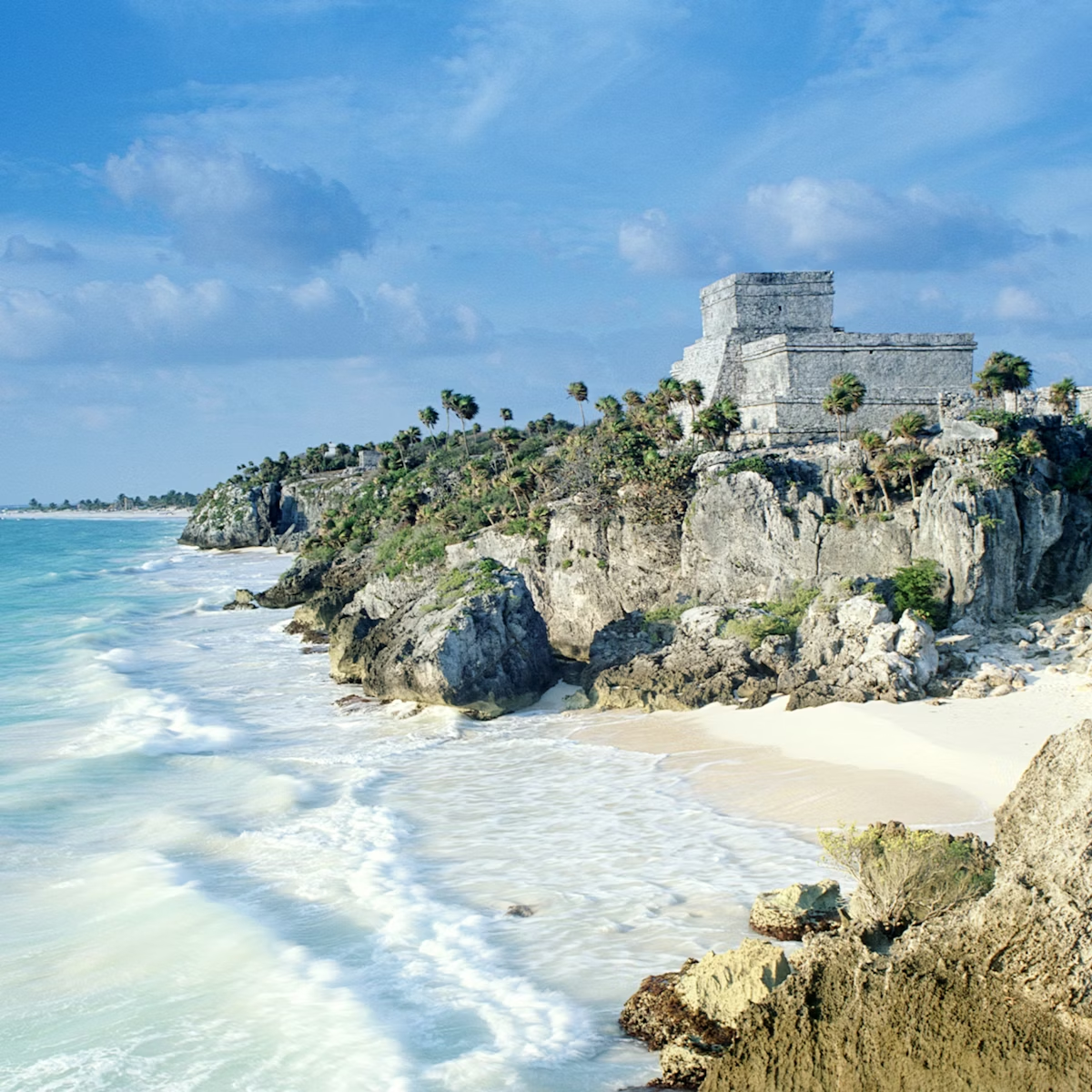At the end of a sand road is the hamlet of Tankah Tres (aka Tankah Bay), a seaside community of vacation homes and small hotels in Mexico, all facing a picturesque cove. Behind the village, a dense mangrove forest conceals Tankah Tres’ star attraction: Cenote Manatí (aka Casa Cenote). Named after the gentle “sea cows” that once frequented it, this open-air cenote is like none other in the region. While most cenotes are roughly in the form of swimming holes, Cenote Manatí’s clear waters wind like a river through the mangrove forest, the exposed tree roots extending like dark knobby fingers into the water below. At one end, its emerald waters feed Sac Aktun, one of the longest underground cave systems in the world, while at the other, a rocky 500m tunnel connects the cenote to the Caribbean. This meeting of the waters – the cool freshwater and the warm salty sea – creates a “halocline effect,” a blurring of the water that makes for remarkable underwater views. It also attracts a diversity of marine life that’s otherwise rare in cenotes. You’ll see everything from green moray eels and tarpon to blue swimming crabs and guppies. And, occasionally, small crocodiles sun themselves on the muddy banks too.
Activities at Tankah Tres
Snorkel
Most people come here for DIY snorkeling. The cenote’s waters are so clear – visibility is often 20m – it’s almost as if the schools of fish are swimming through air. Snorkel gear can be rented onsite (M$400), but you could buy a set from a local supermarket (the megastore Chedraui, found in Tulum and beyond, is a good bet). Even with no gear, swimming the cenote can be quite enjoyable, with treeline views, egrets walking along the edges and tiny fish visible just beneath the surface.
Guided snorkeling tours (M$600 including gear) are offered onsite too but really not worth the cost since Cenote Manatí is only 250m long and losing your way is, well, impossible.
Diving
For divers, the shallow profile (8m) is favored by newbies completing their open water certification. More experienced divers enjoy swimming through the mangrove tunnels and under rocky overhangs; those interested in passing through the cenote’s tunnel to the Caribbean – a surreal experience – must be certified in cave diving. Dive trips are easily arranged through Tankah Divers Tulum, located just down the road from the cenote. Alternatively, you can book through a dive shop in Tulum, which provides transportation.
Kayaking
Kayaks also can be rented here (2-person kayak per hr M$300) but with the cenote often busy with swimmers and snorkelers, there’s not much room to paddle. If you’re set on it, try coming early or late in the day when there are typically fewer visitors.
Beach combing
If you have time, Tankah Tres’ oceanfront is just across the road from Cenote Manatí. The vacation homes and hotels have effectively blocked off the beach, but buying a drink at one of the restaurants will win you access. The narrow band of tawny sand is pleasant for beachcombing and checking out tide pools. DIY snorkelers will enjoy the water here too; the tranquil bay is protected by a healthy coral reef with schools of colorful fish and the occasional sea turtle – the bay’s southern end is especially close to the reef.
What you should bring
Tankah Tres’ amenities are limited so be sure to bring a towel and snorkel gear, if you have it. If you sunburn easily, wear a rash guard or a t-shirt to cover up – sunscreen, even biodegradable ones, are not permitted in Cenote Manatí. For ocean snorkeling, consider bringing water shoes – there are lots of rocks as you enter the water. Finally, be sure to have enough cash to pay your cenote admission as well as for your taxi- or colectivo-ride home.
Tickets and practicalities
The entrance to Cenote Manatí (open 9am-5pm) is on the beach road. Admission is M$150 including a life jacket – a safety measure but also helpful if you’ll be floating or snorkeling. Parking is free and lockers are available for M$50. Come early for a more peaceful experience, and later (on sunny days) for the best underwater photos.
Where to eat
Tankah Tres has a handful of restaurants, all associated with small hotels. The most popular is the Casa Cenote restaurant, directly across from Cenote Manatí. A simple thatch-roof affair on the beach, the restaurant serves up sandwiches and Mexican classics plus good ol’ Texas barbecue on Sundays, which is popular with expats. For something a bit more upscale (you’ll need a shirt), try the ceviche or wood oven pizza next door at Hotel Mereva’s open-air dining room. There’s no ocean view, but the meals more than make up for it. If you just need a snack or a drink, there’s a basic market near the cenote.
Getting to Tanka Tres
Tankah Tres is 10km north of Tulum, off Hwy 307. Colectivos (shuttle vans, M$28) headed to Playa del Carmen drop off passengers at the turn-off; from there, it’s about 0.5km to the beach road, and another 1km from there to Cenote Manatí. All told, it’s about a 20 to 30 minute walk. If you’re driving, turn east at the “Casa Cenote” road sign, between kilometer markers 237 and 238. A guard is typically posted at the start of the beach road – simply state your reason for visiting, and you’ll be waved in. Note: There are several other “Tankahs” in the area (Tankah Caleta, Cenotes Tankah, Parque Tankah) – be sure you’re headed to the right one!






